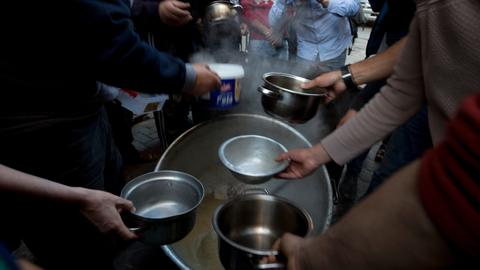The blockade of Gaza has devastated the local economy leading to massive unemployment, says the UN.
This is a story of two different borders.
Across one of them, the United Arab Emirates (UAE) is eagerly making arrangements to receive Israeli tourists after the two countries normalised their diplomatic relations in September.
The other border is fenced with barbed wires and manned by armed soldiers. This is the one Israel shares with the besieged Palestianian territory of Gaza where 2 million people have been left to grind under extreme poverty as the world looks away.
Israel’s 13-year-long blockade of Gaza has devastated its economy, pushed half of the population below the poverty line and created an unemployment nightmare, says the latest United Nations report.
The restriction on movement of people and goods has cut Gaza off from other Palestinian areas and the rest of the world, resulting in an economic loss of $16.7 billion, says the report.
“The vast majority of the population has no access to clean water, electricity or a proper sewage system, and the Gaza Strip experiences major environmental deterioration,” it adds.
Recurring power breakdowns, a severe lack of education and healthcare, as well as people’s inability to work their way to prosperity, have become the hallmark of the Israeli lockdown.
In what a UN official has called a collective punishment, Israel imposed severe restrictions after Hamas took control of Gaza in 2007.
The report, compiled by the UN Conference on Trade and Development, is an indictment against Israeli atrocities.
In the 24 years between 1994 and 2018 – a period of substantial development elsewhere in the world- Gaza’s GDP per capita dropped 37 percent as the economic growth was not able to keep up with a rising population.
Palestinians have no control over their airspace and sea. They depend entirely on Israel’s mercy when it comes to who can leave the territory and what goods can be imported.
A crippling restriction on imports means that even basic products, which are an essential raw material for businesses, can not be bought.
For instance, Tel Aviv doesn’t allow Palestinians to bring in medical equipment, fertilisers, pesticides, steel pipes, and chemicals among dozens of other products that it fears can be used to make weapons. This, in turn, has made it difficult for local businesses to expand and create much-needed jobs.
The heavily guarded border crossings, which are the only way goods and people can come in or go out, have remained shut for most of the period in the past decade.
Israeli officials exercise discretionary powers to decide who is allowed through the main Erez crossing, which for Gazans is a gateway to the Palestinian territories of the West Bank and East Juresalem.
To make matters worse for the Palestinians, the Rafah crossing with Egypt remained closed for many months between 2007 and 2018, the report notes.
With a stranglehold over the sea, Israel is also in control of the livelihood of Palestinian fishermen who cannot venture too far from the shoreline without encountering aggressive Israeli patrol boats.
“People working in the fishing industry are subjected to frequent violence, and those deemed by the Israeli navy to have exceeded the boundaries are arrested, have their boats confiscated and are sometimes shot at, killed or injured,” says the UN report.
The coastal city of Gaza does not have a functional seaport of its own – one that was under construction was destroyed by Israeli forces in 2000 during a conflict. Similarly, the only airport was bombed by Israel and left completely unusable.
The recurrent Israeli attacks have damaged other infrastructure. Electricity supply was limited to just 6 hours a day in 2017 and 2018 as power lines were damaged. The power supply slightly improved to 11 hours a day this year.
For every one Israeli, 40 Palestinians were killed in the three rounds of conflicts the region saw in the past 20 years.
With so many people confined to a 365 square kilometre-long enclave, Gaza has one of the highest population densities in the world, says the report.
Farmers who work on the land close to the border with Israel can only do their job on foot under the watchful eye of soldiers.
This content was originally published here.
EL 2 DE JUNIO DEL 2024 VOTA PARA MANTENER
TU LIBERTAD, LA DEMOCRACIA Y EL RESPETO A LA CONSTITUCIÓN.
VOTA POR XÓCHITL













Comentarios